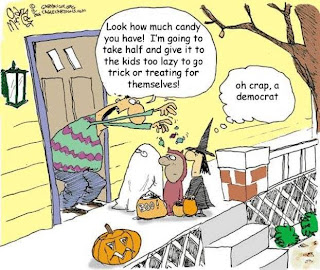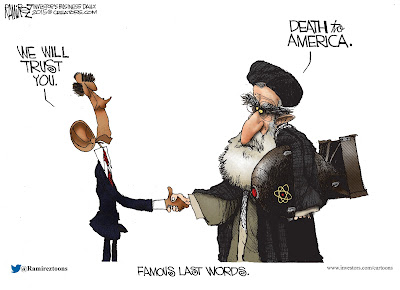Romney & Cain -- a Dynamic Duo & Romney Endorsements
With Palin & Christy now finally definitely out, the GOP field is settling down. Even after the debate at Dartmouth today, the top tier appears to be Romney, Cain & Perry, although Perry seems still stuck in his fallen 3rd place. Cain started for the first time to take criticism of his 9-9-9 plan, and Huntsman said when he first heard of it, he thought it was the price of a pizza, with reference to Cain’s time as Godfather’s Pizza CEO. Bachman took a different humorous tack and noted that 9-9-9 upside down is 666, and that the devil's in the details.

I noted yesterday on Romney’s news page several new lower level endorsements, and today the important endorsement of Chris Christy, New Jersey governor. In his endorsement statement, Christy said that Romney was clearly the most qualified candidate who can beat Obama, with both his business and public leadership experience, saying America cannot survive another 4 years of Obama. He also said that religious matters don’t matter and shouldn’t be an issue (just as when Christy appointed a Muslim judge), but rather one’s record and character. And Ann Coulter, perhaps Christy’s biggest fan, I understand (as I would expect) followed suit, also endorsing Romney.

I’ve been thinking this past week that my dream ticket would be Romney and Cain, and today I hear Ann Coulter shares my view. They’re a dynamic business duo that brings just the experience and leadership we need to right this sinking economy & joblessness that are due to an administration with no business experience and an anti-business agenda. And it could even satisfy those for whom demonstrating tolerance is an all-important virtue – simultaneously demonstrating religious and racial tolerance. That’s twice as much tolerance as the Dems mustered. And a union of the North and the South.
No doubt some seeing my picture with Mitt assumed I was vying for the VP slot. Sorry to disappoint you, as great a running mate as I’d be. I’m holding out for the ambassadorship to Switzerland, having lived there 2 years, as a Mormon missionary, and being a hopeless chocoholic.
And now here’s another endorsement this past week, in the New York Times no less, by op-ed columnist David Brooks. It seems to echo my own earlier defense of Romney posting ("The Case for Romney," June 21, 2011).
http://www.nytimes.com/2011/10/04/opinion/brooks-in-defense-of-romney.html?_r=1&ref=davidbrooks
In Defense of Romney
By DAVID BROOKS
Published: October 3, 2011

I noted yesterday on Romney’s news page several new lower level endorsements, and today the important endorsement of Chris Christy, New Jersey governor. In his endorsement statement, Christy said that Romney was clearly the most qualified candidate who can beat Obama, with both his business and public leadership experience, saying America cannot survive another 4 years of Obama. He also said that religious matters don’t matter and shouldn’t be an issue (just as when Christy appointed a Muslim judge), but rather one’s record and character. And Ann Coulter, perhaps Christy’s biggest fan, I understand (as I would expect) followed suit, also endorsing Romney.

I’ve been thinking this past week that my dream ticket would be Romney and Cain, and today I hear Ann Coulter shares my view. They’re a dynamic business duo that brings just the experience and leadership we need to right this sinking economy & joblessness that are due to an administration with no business experience and an anti-business agenda. And it could even satisfy those for whom demonstrating tolerance is an all-important virtue – simultaneously demonstrating religious and racial tolerance. That’s twice as much tolerance as the Dems mustered. And a union of the North and the South.
No doubt some seeing my picture with Mitt assumed I was vying for the VP slot. Sorry to disappoint you, as great a running mate as I’d be. I’m holding out for the ambassadorship to Switzerland, having lived there 2 years, as a Mormon missionary, and being a hopeless chocoholic.
And now here’s another endorsement this past week, in the New York Times no less, by op-ed columnist David Brooks. It seems to echo my own earlier defense of Romney posting ("The Case for Romney," June 21, 2011).
http://www.nytimes.com/2011/10/04/opinion/brooks-in-defense-of-romney.html?_r=1&ref=davidbrooks
In Defense of Romney
By DAVID BROOKS
Published: October 3, 2011
Over the past several months, Mitt Romney has been an excellent presidential candidate. He has performed superbly in the debates. He has outorganized his rivals. He has relentlessly stayed on his core theme of putting Americans back to work. He has taken Rick Perry apart with a cold ruthlessness that is a wonder to behold.
And throughout this period of excellence, he has done almost nothing to endear himself to Republican activists. They have spent this season of excellence searching for anyone else: Palin, Trump, Bachmann, Perry, Cain and now (Please! Please!) Christie. On Nov. 4, 2010, Romney earned the support of 23 percent of Republican voters, according to the RealClearPolitics average of polls. Today, he also has support from 23 percent of Republicans nationwide.
The central problem is that Mitt Romney doesn’t fit the mold of what many Republicans want in a presidential candidate. They don’t want a technocratic manager. They want a bold, blunt radical outsider who will take on the establishment, speak truth to power and offend the liberal news media.
They don’t want Organization Man. They want Braveheart.
The question is: Are they right to want this? Well, if they want an in-your-face media campaign that will produce delicious thrills for the true believers, they are absolutely right. But if they actually want to elect an effective executive who is right for this moment, they are probably not right.
There are two important features of the current Republican moment. First, this is not a party riven by big ideological differences. This is not Reagan versus Rockefeller. Whoever wins the nomination will be leading a party with a cohesive ideology and a common set of priorities: reform taxes, replace Obamacare, cut spending and reform entitlements. The next president won’t have to come up with a vision, just execute the things almost all Republicans agree upon.
Second, the challenges ahead are technically difficult. There’s a reason that no president since Reagan has been able to reform the tax code. There’s a reason no president save Obama has been able to pass health care reform. These are complicated issues that require a sophisticated inside game — navigating through the special interests, building complex coalitions. They are issues that require executive expertise.
It’s easy to see how Gov. Chris Christie of New Jersey, if he decides to run, could rally public support behind these priorities. He has an amazing ability to talk about policy in concrete, common-sense terms. He might easily be the Republicans’ best option.
Yet Romney’s skills are not to be underestimated. In the first place, he doesn’t throw interceptions. As with quarterbacks, the chief job of a president is not to give the game away with unforced errors. Romney does not take excessive risks. He doesn’t make decisions without advance preparation.
He does adapt. It has been stunning to see how much better Romney is as a candidate this time around than in 2008. This improvement must have come from a pretty thorough period of self-examination and self-correction.
He seems to know how to pick staff. His economic advisers include R. Glenn Hubbard of Columbia, Greg Mankiw of Harvard, former Senator Jim Talent and Vin Weber, a former congressman. This is the gold standard of adviser teams.
He could probably work well with the leaders of his own party. If Romney were to be elected, he would probably share power with the Senate minority leader, Mitch McConnell, and the House speaker, John Boehner. These are not exactly Tea Party radicals. Instead, they are consummate professionals and expert legislators who could plausibly work together. More presidents have been undone by the Congressional leaders in their own party than by members of the opposition.
Romney may be able to guard against ideological overreach. Each successive recent administration has overread its election mandate. Romney may be inauthentic, but he is rarely overzealous.
He comes from a blue state. Candidates who come from states where their party is in the minority are much more likely to be elected. In government, it really helps to have a feel for how people in the other party think. Neither President Obama nor George W. Bush had this.
Finally, Romney can be dull. Political activists like exciting candidates. But most people, who have lower expectations from politics and politicians, just want them to provide basic order. They want government to be orderly so they can be daring in other spheres of their lives. Romney is the most predictable of the candidates and would make for the most soporific of presidents. That’s a good thing. Government would function better if partisan passions were on a lower flame.
It’s exciting to have charismatic leaders. But often the best leaders in business, in government and in life are not glittering saviors. They are professionals you hire to get a job done.
The strongest case for Romney is that he’s nobody’s idea of a savior.





I enjoyed reading David Brooks article, I missed that one, thanks for pointing it out.
ReplyDelete